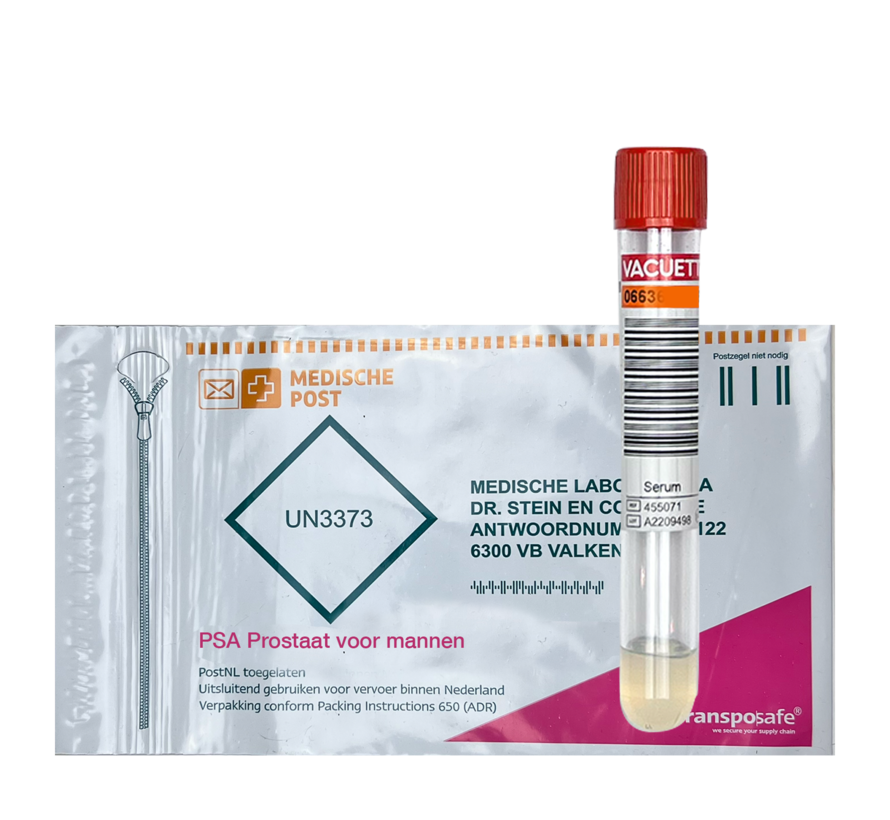Prostate (PSA)
The PSA test is done to see if prostate cancer may be present.
To do this, the test measures the amount of Prostate Specific Antigen (PSA) in the blood.
An elevated PSA level
If the PSA in the blood is elevated, it may indicate prostate cancer. But it need not always be so. For example, the PSA is also elevated in inflammation of the prostate (prostatitis) and in benign disease of the prostate (benign prostatic hypertrophy, and BPH). BPH means that the prostate tissue is more active than normal, but is not cancerous. Furthermore, slight increases in PSA may be seen in people of African-American origin. In any man, blood PSA levels will slowly increase with age.
When to measure PSA?
Starting at 35 or 40, have your PSA value determined. It is important to know that every man possesses an individual baseline PSA value. In fact, every man of 45 should know this value. Men whose close relatives suffer from prostate cancer should have a test done as early as 35 or 40.
Without a test, one often does not notice that something is wrong until it is already too late. Possible symptoms, such as a weak urine stream and frequent urination are common with an and benign prostate enlargement and (Benign Prostate Hyperplasia, BPH). An elevated PSA level can have several causes. There may be inflammation, or there may be a benign or malignant tumor present.
In nine out of 10 cases, prostate cancer is curable if detected early.
The PSA test
PSA is currently the most important substance in the blood to diagnose prostate cancer. Since its discovery (PSA was first found only in 1971), it has been increasingly investigated and this has led to a sharp increase in the number of early prostate cancers detected. However, it soon became clear that not all prostate cancers have an elevated PSA and that not every increase is associated with cancer.
For values in the gray area (see also values and interpretation) it is useful to also measure the ratio of free PSA to total PSA (free ratio). If this value is less than 0.25, the probability for prostate cancer increases. 1 in 6 patients with a value less than 0.25 actually have prostate cancer.
Recent research has shown that most life-threatening prostate tumors grow very slowly. As a result, the PSA rises only slowly. The impact of prostate enlargement and inflammation is then so great that the ability to predict aggressive tumors from elevated PSA levels is completely lost.
The PSA test result
The interpretation of the PSA test result is not easy because with age, PSA levels in the blood increase without necessarily showing any abnormality of the prostate. Over the age of 50, 2 in every 10 men (20%) are found to have elevated PSA levels. These elevated levels may indicate prostate cancer, but they also occur with benign prostate enlargement, a urinary tract infection or prostatitis. Therefore, an elevated PSA value always requires additional testing. However, the higher the PSA value is, the more likely it is that prostate cancer is present. Should you need help interpreting the results, you can request a consultation with one of our specialists.
As the prostate ages and grows, so will the PSA.
When the PSA total is greater than and 4.0 then free PSA can be added.
From a value greater than 10 this is recommended.
To decide whether it makes sense for you to request the PSA test, you can use this decision aid: https://www.thuisarts.nl/keuzehulpen/psa
Advantages and disadvantages at a glance
| Benefits of PSA test | Disadvantages of PSA test |
|---|---|
| If the test result is normal, that's reassuring. | If your results are normal, there is a very small chance that you do have prostate cancer. |
| The PSA test can help detect prostate cancer before you may have symptoms. If prostate cancer is growing rapidly, it is good to know. Because then immediate treatment may be needed. | If the PSA is elevated, prostate cancer is often not found. You have then worried unnecessarily. The anxiety can sometimes be permanent. |
| If prostate cancer is found, you can decide whether to have it treated or not. | If prostate cancer is found, the chances are that you will never be affected. In that case, you will have to live with the idea of being a cancer patient unnecessarily. It may be difficult to say no to possible treatments. |
| If your treatment is successful, you will not get (complaints of) metastases later on. | Treatment for prostate cancer can have a variety of side effects, including erection problems, incontinence, and bowel problems. |
| Your chance of dying from this disease is slightly reduced. | If prostate cancer is detected early by a PSA test, you are unlikely to live longer, but it can reduce your quality of life. |










